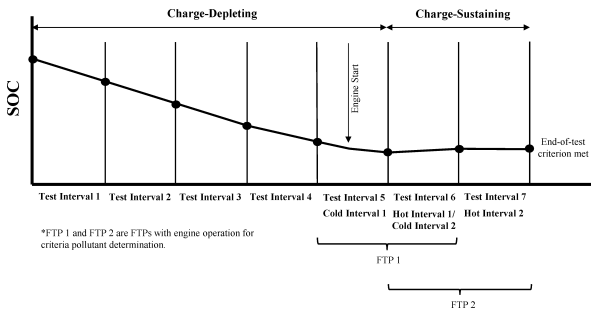...
(a) Measure emissions using the transient Federal Test Procedure (FTP) as described in this section to determine whether engines meet the emission standards in subpart B of this part. Operate the engine or hybrid powertrain over one of the following transient duty cycles:
(1) For engines subject to spark-ignition standards, use the transient test interval described in paragraph (b) of appendix B to this part.
(2) For engines subject to compression-ignition standards, use the transient test interval described in paragraph (c) of appendix B to this part.
(b) Procedures apply differently for testing certain kinds of engines and powertrains as follows:
(1) The transient test intervals for nonhybrid engine testing are based on normalized speed and torque values. Denormalize speed as described in 40 CFR 1065.512. Denormalize torque as described in 40 CFR 1065.610(d).
(2) Test hybrid powertrains as described in §1036.510(b)(2), with the following exceptions:
(i) Replace Pcontrated with Prated, which is the peak rated power determined in §1036.520.
(ii) Keep the transmission in drive for all idle segments after the initial idle segment.
(iii) For hybrid engines, you may request to change the engine-commanded torque at idle to better represent curb idle transmission torque (CITT).
(iv) For plug-in hybrid powertrains, test over the FTP in both charge-sustaining and charge-depleting operation for both criteria and greenhouse gas pollutant determination.
(c) Except as specified in paragraph (d) of this section for plug-in hybrid powertrains, the FTP duty cycle consists of an initial run through the test interval from a cold start as described in 40 CFR part 1065, subpart F, followed by a (20 ±1) minute hot soak with no engine operation, and then a final hot start run through the same transient test interval. Engine starting is part of both the cold-start and hot-start test intervals. Calculate the total emission mass of each constituent, m, over each test interval as described in 40 CFR 1065.650. Calculate the total work, W, over the test interval as described in 40 CFR 1065.650(d). For hybrid powertrains, calculate W using system power, Psys as described in §1036.520(f). Determine Psys using §1036.520(f). For powertrains with automatic transmissions, account for and include the work produced by the engine from the CITT load. Calculate the official transient emission result from the cold-start and hot-start test intervals using the following equation:

Eq. 1036.512-1
(d) Determine criteria pollutant emissions for plug-in hybrid powertrains as follows:
(1) Carry out a charge-sustaining test as described in paragraph (b)(2) of this section.
(2) Carry out a charge-depleting test as described in paragraph (b)(2) of this section, except as follows:
(i) Fully charge the battery after preconditioning.
(ii) Operate the engine or powertrain over one FTP duty cycle followed by alternating repeats of a 20-minute soak and a hot start test interval until you reach the end-of-test criteria defined in 40 CFR 1066.501(a)(3).
(iii) Calculate emission results for each successive pair of test intervals. Calculate the emission result by treating the first of the two test intervals as a cold-start test. Figure 1 to paragraph (d)(4) of this section provides an example of a charge-depleting test sequence where there are three test intervals with engine operation for two overlapping FTP duty cycles.
(3) Report the highest emission result for each criteria pollutant from all tests in paragraphs (d)(1) and (2) of this section, even if those individual results come from different test intervals.
(4) The following figure illustrates an example of an FTP charge-depleting test sequence:
Figure 1 to Paragraph (d)(4) of §1036.512—FTP Charge-Depleting Criteria Pollutant Test Sequence

(e) Determine greenhouse gas pollutant emissions for plug-in hybrid engines and powertrains using the emissions results for all the transient duty cycle test intervals described in either paragraph (b) or (c) of appendix B to this part for both charge-depleting and charge-sustaining operation from paragraph (d)(2) of this section. Calculate the utility factor weighted composite mass of emissions from the charge-depleting and charge-sustaining test results, eUF[emission]comp, as described in §1036.510(e), replacing occurances of “SET” with “transient test interval”. Note this results in composite FTP GHG emission results for plug-in hybrid engines and powertrains without the use of the cold-start and hot-start test interval weighting factors in Eq. 1036.512-1.
(f) Calculate and evaluate cycle-validation criteria as specified in 40 CFR 1065.514 for nonhybrid engines and §1036.545 for hybrid powertrains.
[88 FR 4487, Jan. 24, 2023; 89 FR 29745, Apr. 22, 2024]
